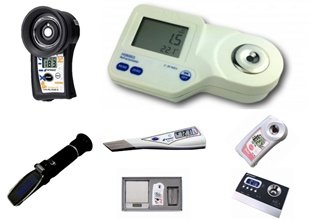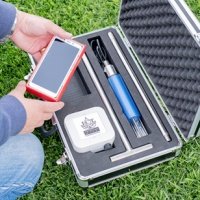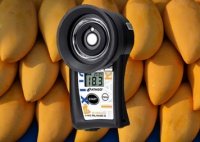Seven Handy Tips to Help You Choose the Right Refractometer

There are currently over 150 refractometers available in the Instrument Choice online store, including meters measuring Brix, Refractive Index and Moisture Content. With so many to choose from finding the best refractometer for your application can seem a daunting task.
To help Instrument Choice Scientists have put together several handy tips to help you choose the best refractometer for your application.
About Refractometers
Light changes direction when it enters a liquid, and this phenomenon is called refraction. A refractometer is an instrument that measures the concentration of a particular substance within an aqueous solution by measuring the sample’s refraction angles and correlating them to already established refractive index values.
You will find refractometers used in the food, beverage, chemical, manufacturing, medical and agricultural industries. Examples of measured parameters include:
|
|
Seven Handy Tips to Help You Choose the Right Refractometer
1. Select a Refractometer That Measures What You Need
As mentioned above, there are diverse kinds of refractometers, all employing different measurement scales based on specific refractive index values. So the first step is determining which parameter you wish to measure.
2. Measurement Range
The second step is to ensure that the measurement range is ideal for your application. Not all meters measure the full scale, and this is especially true for Brix meters. Narrow down your selection by browsing only those meters which measure your required range.
3. Digital Vs Optical
Once you have decided on a parameter and measurement range, an easy way to narrow your search is to choose between digital and optical refractometers. See below for some pros and cons of each meter type.
Pros – Digital |
Cons - Digital |
|
Higher resolution and accuracy Measured results are easy to understand and not up for interpretation. More user-friendly features: More recent models have NFC or Bluetooth for each transfer of data. |
Require batteries or power source Generally higher cost compared to optical models. |
Pros - Optical |
Cons Optical |
|
Most optical refractometers do not require batteries. Price: For the most part, these meters are cheaper than their digital counterparts.
|
Typically lower resolution and accuracy. Reading may be subjective, depending on how users interpret the scales. Users look through an eyepiece to view the scale. Associated risks are worth considering this when measuring chemicals or other potentially dangerous samples. |
4. Temperature Compensation
Automatic temperature compensation is fast becoming an essential feature for most refractometers. While ATC is not vital, it does act to increase the accuracy and speed of your measurements. Without ATC, you need to wait for both your sample and your meter to reach an ambient temperature to obtain an accurate reading. Where this is not possible, you need to calculate a temperature adjustment manually.
Scientists’ Tip: We recommend meters with ATC – they save time, reduce mistakes and increase your accuracy - win-win-win!
5. Accuracy
So you now know your scale, refractometer type, measurement range, and whether or not you want ATC. The fifth step is to determine your required accuracy level. Unfortunately, accuracy comes at a price. Generally, the higher the accuracy, the higher the meter's cost. In situations where accuracy is vital to product quality control, you need a very precise meter. In less critical circumstances, a broader accuracy range may be acceptable.
Scientists’ Tip: Check your industry standards or internal quality control specifications to determine your refractometers required accuracy level.
6. What Other Features?
By now, your search should narrow to a few products. Our scientists recommend asking yourself the following questions to make your final choice
Who will use the instrument?
Consider the skill set of the persons expected to use the refractometer and what you would like them to achieve. A laboratory-grade refractometer with a complex interface would be overkill for everyday use. On the other hand, a basic optical meter might not cut it in a research role.
In what environment will you use the refractometer?
Will external light be an issue? Then look for meters with prism covers or ELI functionality. If the application’s environment is wet or dusty, select a meter with an appropriate IP rating.
Is the meter’s design right for your task?
The sort of questions that need answering include; How will you be using your refractometer? Will the meter need to be portable or will a single location benchtop meter suffice?
7. Ask an expert
If you become stuck on any of the six steps listed prior, contact us! Our customer service team are qualified, experienced scientists ready and available to give professional and unbiased product recommendations to help you find the best refractometer for your application.
Conclusion
With well over 150 refractometers available at Instrument Choice, choosing the best for your application can seem an impossible task. Following the seven steps above will ensure you find the best refractometer for your unique application.
Want more information about a specific refractometer? Don’t know which measurement refractometer suits your application? Please speak to our experts! We’re here to help!
Call 1300 737 871 or email [email protected].
Also interesting
Instrument Choice regularly reviews new and popular products, so when searching for the perfect scientific instrument for your application, you can make more informed decisions.
This review assesses the Instant Soil Moisture Reading Kit (Product Code: IC-MPKit-406B). This sought-after, reliable and portable soil moisture sensor doesn’t require regular calibration and accuracy is unaffected by temperature. Its impressive features and functions make it ideal for soil moisture testing applications, such as sports fields, irrigation monitoring, academic research, and more.
Read on for a scientists’ review of the IC-MPKit-406B kit.

Atago Instruments manufacture a wide range of Brix refractometers for the convenient on-site measurement of Brix for almost any application. This article outlines five of the main types of on-site Atago Brix Refractometers and spotlights some exceptional product examples.
Find an Atago Refractometer to meet your unique on-site application here

